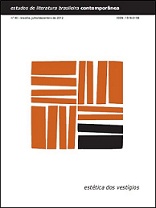Cidade de Deus:
entre o testemunho e a ficção
DOI:
https://doi.org/10.1590/S2316-40182012000200009Resumo
O presente artigo discute a problemática em torno da separação epistemológica entre o romance Cidade de Deus e seu autor, Paulo Lins, bem como as conotações referentes a possíveis leituras da obra no tangente ao seu “valor-verdade”. O estudo busca ainda analisar a recepção do texto de Lins no que convencionalmente veio chamar-se, dentro do contexto latino-americano, de testimonio. A análise da obra de Lins sob a rubrica testemunhal nos permitirá meditar sobre problemáticas questões relacionadas a qualquer texto fictício cujo conteúdo se faz demasiadamente próximo a eventos reconhecidamente fatuais, o que leva a obra literária e seus possíveis rótulos a uma crise ontológica cuja repercussão problematiza a literatura como um veículo de denúncia social e o autor como o mediador de tal processo.
Downloads
Referências
BARROS, Sandro R. (2006). “Lifewriting with a vengeance: truth, subalternity and autobiographical determination in Reinaldo Arenas’s Antes que anochezca”. Caribe, v. 9, n. 1, p. 41-56.
________ (2010). Competing truths in Latin America: narrating otherness and marginality. Mountain View: Floricanto Press.
BARTHES, Roland (1972). Mythologies. Trad. Anette Lavers. New York: Hill and Wang.
________ (1977). “The death of the author”. In: Image, music, text. Trad. Stephen Heath. Glasgow: Fontana.
BAUDRILLARD, Jean (2004). Simulacra and simulation. Trad. Sheila Faria Glaser. Ann Arbor: University of Michigan Press.
BELENGUER, Mercè Picornell (2002). “Gestores de la voz ajena: el intelectual como mediador en la escritura testimonial”. Brujula, v. 1, n. 1, p. 37-52.
BEVERLEY, John (1999). Subalternity and representation. Durham: Duke University Press.
________ (2004). Testimonio: on the politics of truth. Minneapolis: University of Minessota Press.
CORONIL, Fernando (2000). “Listening to the subaltern: postcolonial studies and the neocolonial poetics of subaltern studies”. In: CHRISMAN, Laura; PERRY, Benita (Eds.). Postcolonial theory and criticism. Woodbridge: D. S. Brewer.
DERRIDA, Jacques (1997). Of grammatology. Trad. G. C. Spivak. Baltimore: Johns Hopkins University Press.
D’SOUZA, Dinesh (1991). Illiberal education: the olitics of race and sex on campus. New York: The Free Press.
GUSSOW, Mel (2004). “From Brazilian slums to Hollywood: a second wind for a director’s gritty slice of life”. The New York Times, New York, seção E, p. 1, 19 fev.
JOCENIR (2001). Diário de um detento. São Paulo: Laborletra.
LEJEUNE, Philippe (1989). On autobiography. Trad. Katherine Leary. Minneapolis: University of Minnesota Press.
LINS, Paulo (2002 [1997]). Cidade de Deus. São Paulo: Companhia das Letras.
LOUREIRO, Angel (2001). The ethics of autobiography: replacing the subject in modern Spain. Nashville: Vanderbilt University Press.
MENCHU, Rigoberta (1984). Me llamo Rigoberta Menchú y así se me nació la conciencia. Ed. Elizabeth Burgos Debray. Habana: Casa de las Américas.
PINO, Julio César (1997). Family and the favela: the reproduction of poverty in Rio de Janeiro. Wesport: Greenwood.
RIBEIRO, Paulo Jorge (2003). “Cidade de Deus na zona do contato: alguns impasses da crítica cultural contemporánea”. Revista de crítica literaria latinoamericana, n. 57, p. 125-139.
SKLODOWSKA, Elzbieta (1993). “Testimonio mediatizado: ¿ventriloquía o heteroglosia?” Revista de crítica literaria latinoamericana, n. 38, p. 81-90.
SPIVAK, Gayatri Chakravorty (1995). “Can the subaltern speak?” In: ASCHCROFT, Bill (Ed.). The postcolonial studies reader. New York: Routledge.
________ (1998). “Three women’s texts and circumfession”. In: HORNUNG, Alfred; HUSTER, Ernspeter (Eds.). Postcolonialism and autobiography. Atalanta: Rodopi.
VARELLA, Dráuzio (1999). Estação Carandiru. São Paulo: Companhia das Letras.
ZENI, Bruno (2002). Sobrevivente André du Rap (do Massacre do Carandiru). São Paulo: Labortexto.
Downloads
Publicado
Como Citar
Edição
Seção
Licença
Autores que publicam nesta revista concordam com os seguintes termos:
a) Os(as) autores(as) mantêm os direitos autorais e concedem à revista o direito de primeira publicação, sendo o trabalho simultaneamente licenciado sob a Licença Creative Commons de Atribuição-Não Comercial 4.0, o que permite o compartilhamento do trabalho com reconhecimento da autoria do trabalho e publicação inicial nesta revista.
b) Os(as) autores(as) têm autorização para assumir contratos adicionais separadamente, para distribuição não-exclusiva da versão do trabalho publicada nesta revista (ex.: publicar em repositório institucional ou como capítulo de livro), com reconhecimento de autoria e publicação inicial nesta revista.
c) Autores têm permissão e são estimulados a publicar e distribuir seu trabalho on-line (ex.: em repositórios institucionais ou na sua página pessoal) após o processo editorial, já que isso pode gerar alterações produtivas, bem como aumentar o impacto e a citação do trabalho publicado (Veja O Efeito do Acesso Livre).
d) Os(as) autores(as) dos trabalhos aprovados autorizam a revista a, após a publicação, ceder seu conteúdo para reprodução em indexadores de conteúdo, bibliotecas virtuais e similares.
e) Os(as) autores(as) assumem que os textos submetidos à publicação são de sua criação original, responsabilizando-se inteiramente por seu conteúdo em caso de eventual impugnação por parte de terceiros.


